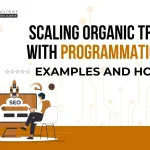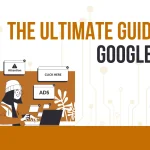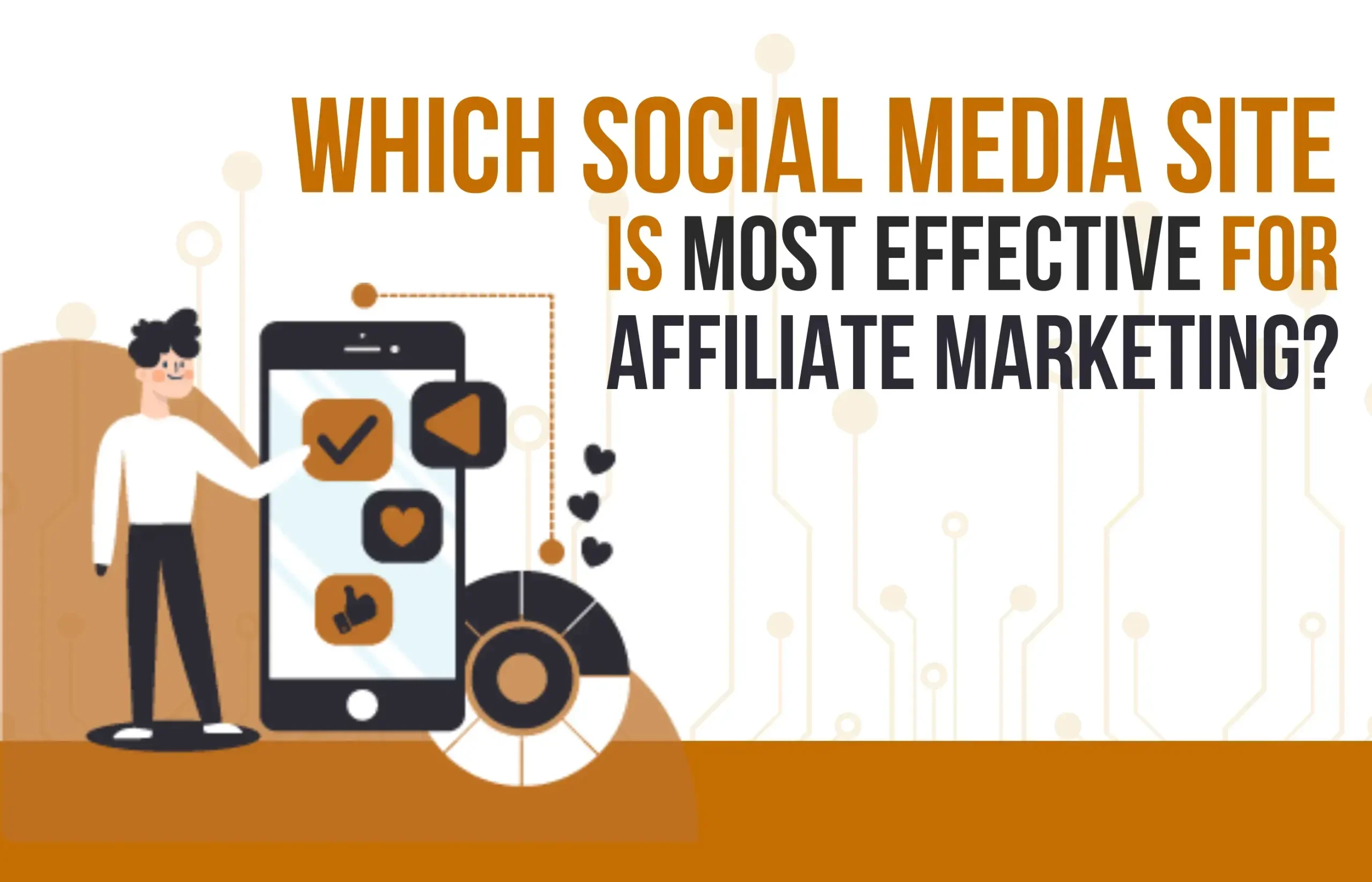What is Affiliate Marketing?
Affiliate marketing is a performance-based marketing model where businesses reward affiliates (also known as publishers or partners) for driving traffic or sales to their websites through the affiliate’s marketing efforts. Affiliates promote products or services through various channels, such as websites, blogs, social media, email marketing, and more. They receive a commission or a percentage of the sales they generate for the merchant.
How does affiliate marketing work for businesses and affiliates?
Businesses, also referred to as merchants or advertisers, benefit from affiliate marketing by tapping into the marketing efforts of affiliates without incurring upfront costs. Instead, they pay commissions only when affiliates bring in desired actions, such as sales, leads, or clicks. On the other side, affiliates can monetize their online presence and marketing skills by promoting products or services that align with their niche or target audience.
The Benefits of Affiliate Marketing for Both Parties
For Businesses (Merchants)
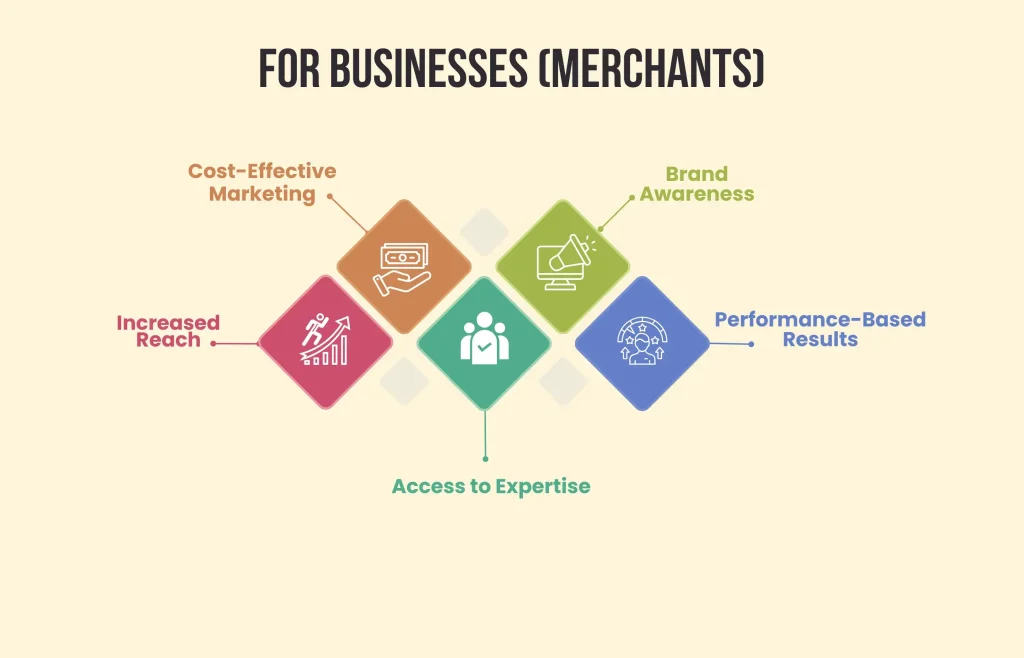
Cost-Effective Marketing
Businesses only pay for performance, ensuring they invest in marketing efforts that generate actual results.
Increased Reach
Affiliates can tap into niche audiences and markets that the business might not have reached through traditional marketing channels.
Brand Awareness
Affiliate marketing exposes the brand to a broader audience, increasing brand visibility and recognition.
Access to Expertise
Affiliates often have specialized knowledge and expertise in their respective niches, providing valuable insights and feedback.
Performance-Based Results
Businesses can measure the effectiveness of affiliate campaigns through metrics such as clicks, conversions, and ROI.
For Affiliates
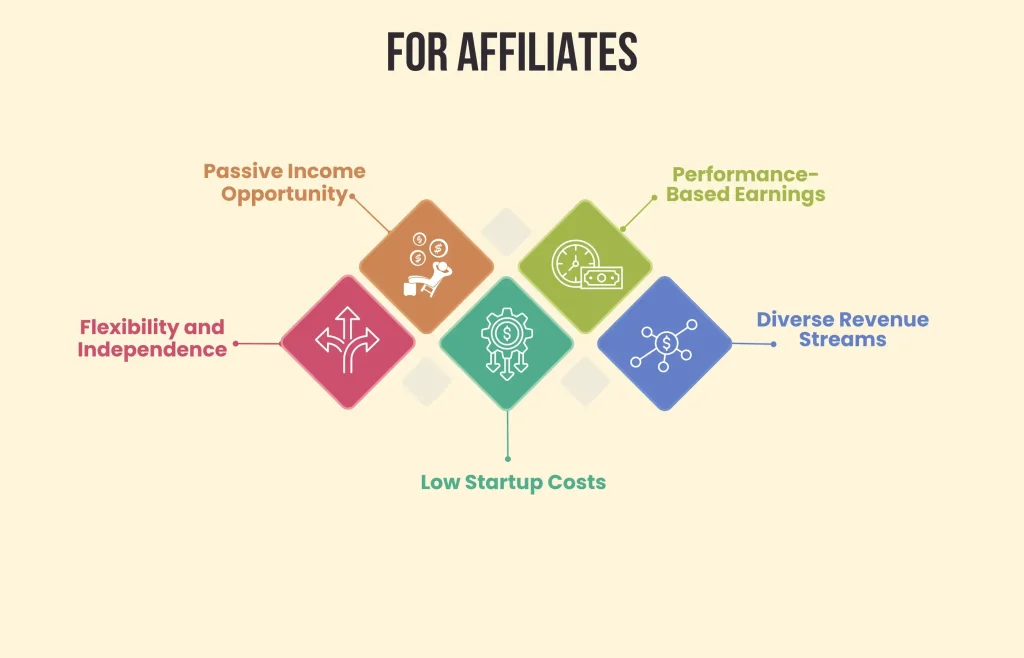
Passive Income Opportunity
Affiliates can earn passive income by promoting products or services without the need to create or manage them.
Flexibility and Independence
Affiliates have the freedom to choose products they are passionate about and promote them in ways that suit their personal style.
Low Startup Costs
Affiliate marketing requires minimal investment, making it accessible to individuals with limited resources.
Diverse Revenue Streams
Affiliates can partner with multiple merchants, creating diverse income streams from various products or services.
Performance-Based Earnings
Affiliates earn commissions based on their performance, incentivizing them to optimize their promotional efforts for better results.
The Rise of Social Media Affiliate Marketing
Exploring the synergy between affiliate marketing and social media
Social media affiliate marketing has thrived in the ideal environment of various social media platforms. With their vast user bases, high engagement potential, and diverse content formats, these platforms offer unparalleled opportunities for affiliates. Affiliates can create personalized connections with their followers, resulting in more authentic and targeted marketing. Social media’s ability to share content quickly and reach millions of users amplifies the reach of affiliate campaigns.
Why social media is a game-changer for affiliate marketers?
Social media has transformed the way people consume content and interact with brands. With seamless integrations for sharing affiliate links, affiliate marketers can reach their target audience more effectively. The interactive nature of social media also enables affiliates to engage directly with potential customers, answer questions, and address concerns, fostering trust and credibility.
Choosing the Best Social Media Platforms for Affiliate Marketing
When delving into social media affiliate marketing, it’s crucial to choose the right platforms that align with your niche and target audience. For instance, Facebook’s diverse demographics make it suitable for a wide range of products and services. Instagram, on the other hand, thrives on visual content, making it ideal for fashion, beauty, and lifestyle niches. Understanding the unique strengths and limitations of each platform empowers affiliates to tailor their content and maximize their reach.
Evaluating different social media platforms for affiliate promotion
Each social media platform has unique characteristics and caters to specific demographics. Evaluating platforms like Facebook, Instagram, Pinterest, Twitter, and LinkedIn allows affiliates to identify which best aligns with their niche, target audience, and content style.
Advantages and limitations of each platform for affiliates
Understanding the strengths and weaknesses of each platform empowers affiliates to make informed decisions. For example, Facebook offers a massive user base, diverse ad formats, and robust analytics, but competition can be high. Instagram excels in visual marketing, but affiliate links are not directly clickable in post captions, requiring strategic approaches.
Making your affiliate marketing strategy to fit the platform
A one-size-fits-all approach does not work in social media affiliate marketing. Tailoring the content, posting frequency, and engagement style to suit the preferences of each platform ensures better user experiences and higher chances of success.
Facebook Affiliate Marketing
Facebook affiliate marketing offers a lucrative opportunity for marketers looking to broaden their audience and boost conversions. With billions of active users, Facebook serves as a goldmine for affiliate marketers. Utilizing Facebook Pages, Groups, and even personal profiles strategically can foster engagement and create a loyal following. It’s essential to comply with Facebook’s advertising policies, and transparently disclose affiliate partnerships to build trust with your audience.
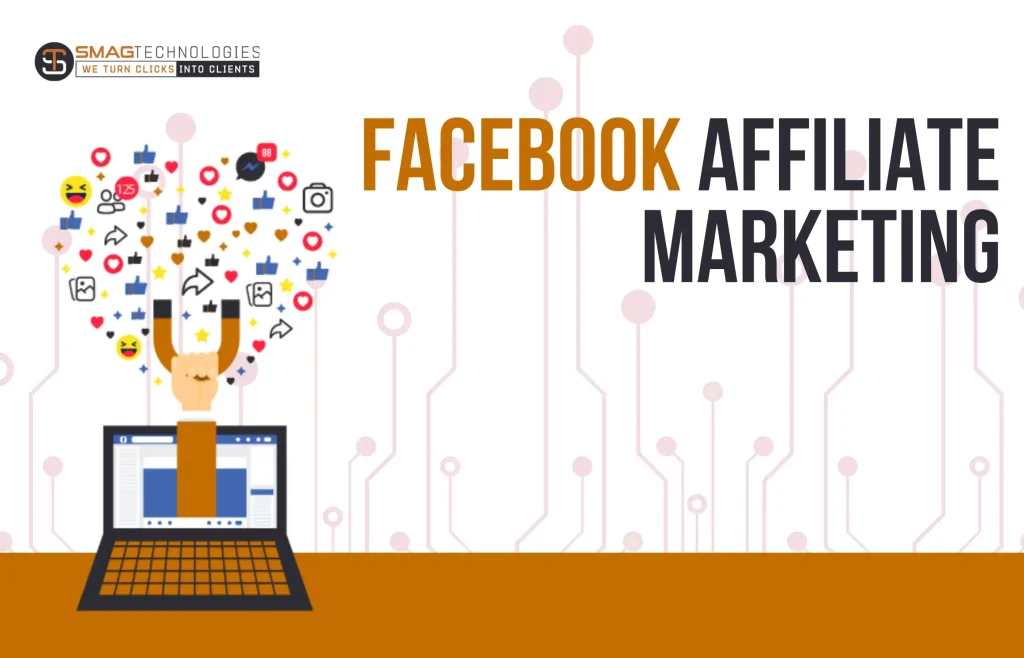
Leveraging Facebook's massive audience for affiliate marketing
Facebook boasts billions of active users worldwide, making it an invaluable platform for reaching diverse audiences. Leveraging features like Facebook Pages, Groups, and advertising tools enables affiliates to tap into this vast user base effectively.
Creating effective affiliate campaigns on Facebook
Successful Facebook affiliate marketing campaigns require compelling ad copy, visually appealing creatives, and well-targeted audiences. Understanding the nuances of Facebook’s ad platform, A/B testing, and optimizing campaigns based on performance metrics is essential for driving conversions.
Compliance guidelines and best practices for affiliate marketers
To maintain a positive reputation and avoid potential penalties, affiliate marketers on Facebook must adhere to the platform’s advertising policies and guidelines. This includes transparently disclosing affiliate partnerships, avoiding misleading claims, and adhering to community standards.
Understanding Facebook Ads for affiliate promotion
Facebook Ads offer sophisticated targeting options, allowing affiliates to narrow down their audience based on demographics, interests, behaviors, and more. This precision targeting helps reach the most relevant potential customers for higher conversion rates.
Analyzing metrics and optimizing your Facebook Ads for better results
Monitoring key performance metrics like click-through rates (CTR), conversion rates, return on ad spend (ROAS), and cost per conversion allows affiliates to gauge the effectiveness of their campaigns. Regularly analyzing these metrics and making data-driven adjustments ensures continuous improvement and a higher ROI.
Instagram Affiliate Marketing
In the realm of Instagram Affiliate Marketing, the platform’s emphasis on visuals provides affiliates with unique and enticing opportunities to showcase products and services in a creative manner. By curating aesthetically pleasing content and leveraging features like Stories, Reels, and IGTV, affiliates can captivate their followers and build brand authority. Building meaningful connections with your audience through authentic storytelling and engaging with comments and direct messages helps foster a loyal community.
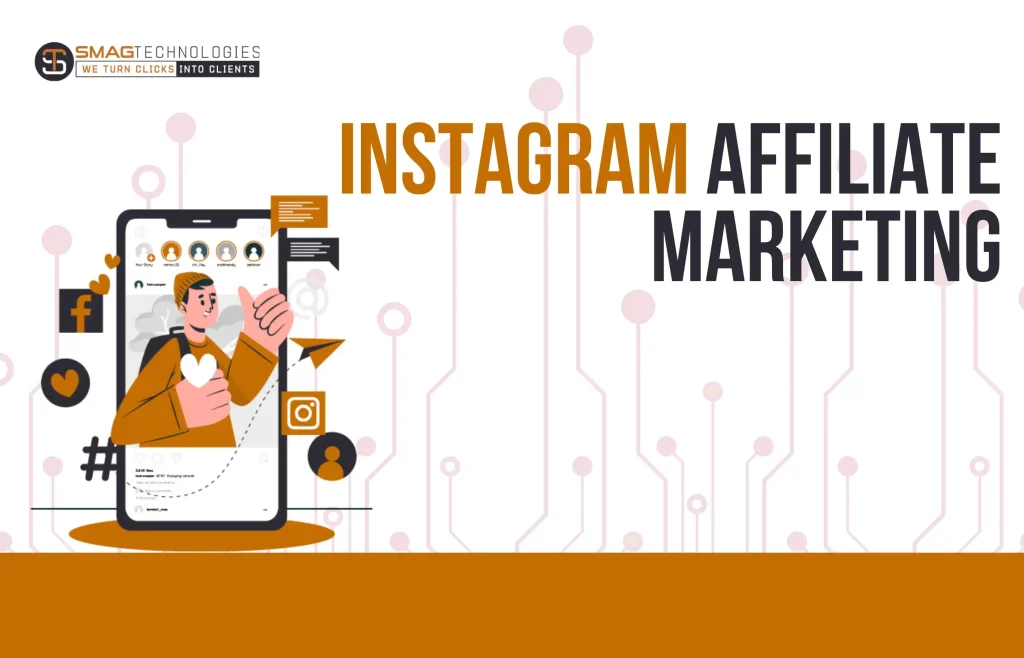
Focusing the visual appeal of Instagram for affiliate marketing
Instagram’s visual-first approach makes it an ideal platform for showcasing products and services. High-quality images and engaging videos have the potential to captivate users and pique their interest in the promoted offerings.
Building a strong affiliate presence on Instagram
Creating a strong brand presence through Instagram affiliate marketing involves defining a consistent visual style, establishing a clear niche, and fostering an authentic and relatable brand identity. This enables affiliates to stand out in a competitive landscape and build a loyal follower base.
Engaging your audience with compelling affiliate content
Engaging content is key to fostering a dedicated and interactive audience. Captions that tell stories, encourage user participation, and call-to-actions that prompt users to click the affiliate links can significantly improve engagement rates and drive conversions.
Pinterest Affiliate Marketing
In the realm of Pinterest Affiliate Marketing, the platform’s unique characteristic as a search engine sets it apart from traditional social media platforms. This characteristic makes it perfect for driving organic traffic to affiliate links. Crafting visually appealing and informative pins, optimizing descriptions and titles with relevant keywords, and strategically organizing boards can boost your visibility and ultimately lead to higher click-through rates and conversions.
How is Pinterest affiliate marketing beneficial for affiliate marketers?
Pinterest is unique among social media platforms as it primarily functions as a visual search engine. Understanding how to leverage Pinterest’s search capabilities, content discovery features, and user behavior empowers affiliates to reach a highly receptive audience.
Creating engaging affiliate pins and boards
Compelling visual content is crucial on Pinterest. Designing eye-catching pins with clear calls-to-action, optimizing pin descriptions with relevant keywords, and strategically organizing boards ensure maximum visibility and click-through rates.
Driving traffic and conversions through Pinterest affiliate marketing
Pinterest’s focus on driving traffic makes it an excellent platform for affiliate marketers looking to generate clicks to their affiliate links. By consistently sharing valuable content, linking to high-converting landing pages, and analyzing traffic data, affiliates can optimize their Pinterest strategy for better conversions.
Is Affiliate Marketing Worth It? Debunking Myths and Realities
Risks and rewards of affiliate marketing
Risks
Uncertain Income
Affiliate marketing income can be unpredictable, and there is no guaranteed paycheck, especially during the initial stages.
Dependence on Merchant
Affiliates rely on the merchant’s product quality, customer service, and business practices, which can impact their reputation.
Affiliate Program Changes
Merchants may modify commission rates or terms, affecting an affiliate’s earnings.
Competition
The affiliate marketing space can be highly competitive, making it challenging to stand out and attract an audience.
Fraud and Scams
Some affiliate programs or partners may engage in fraudulent activities, leading to potential reputation damage for affiliates.
Rewards
Passive Income Potential
Once established, successful affiliate marketing campaigns can generate passive income as long as the content remains relevant.
Low Startup Costs
Affiliate marketing typically requires minimal upfront investment, making it accessible to individuals with limited resources.
Diverse Product Selection
Affiliates can choose from a wide range of products and services to promote, aligning with their interests or niche.
Flexibility and Freedom
Affiliates have the freedom to work on their terms, such as setting their own schedules and choosing promotional methods.
Scalability
Successful affiliate marketers can scale their efforts, expanding their reach to new audiences and increasing potential earnings.
Essential Affiliate Marketing Tools for Social Media Success
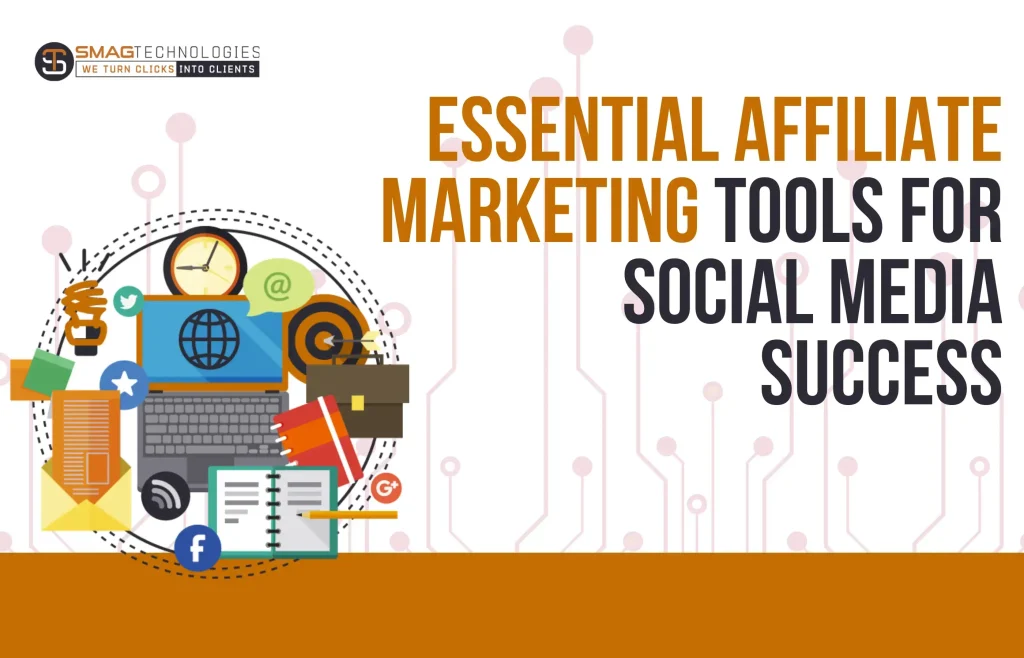
Must-have tools and resources for social media affiliate marketers
In Affiliate Marketing Tools, incorporating a range of resources can significantly improve efficiency and effectiveness in social media affiliate marketing. Among these tools are social media management platforms, link-tracking tools, content creation resources, and analytics solutions. Utilizing these resources allows affiliates to streamline their marketing efforts, track performance, create engaging content, and gain valuable insights into the success of their campaigns.
Automating tasks and optimizing your affiliate workflow
Automating repetitive tasks and streamlining the affiliate marketing workflow enables affiliates to focus on strategy and content creation. This could involve using scheduling tools for social media posts, automated email marketing, or link management systems.
Top affiliate marketing plugins, software, and analytics platforms
Discovering and utilizing top-rated affiliate marketing plugins, software, and analytics platforms can significantly enhance the affiliate marketing experience. These tools offer valuable insights, advanced features, and user-friendly interfaces to boost performance and track progress effectively.
Wrap Up!
Social media has emerged as a powerful tool for affiliate marketers to connect with their target audience, build relationships, and drive conversions. The dynamic nature of platforms like Facebook, Instagram, and Pinterest offers unique opportunities for affiliates to showcase products creatively and engage with users authentically. By understanding the risks and rewards of affiliate marketing and leveraging the right strategies and tools, both businesses and affiliates can thrive in this ever-evolving landscape. So, seize the potential of social media affiliate marketing, learn from successful campaigns, and craft your path to success in this exciting and rewarding world of affiliate marketing.
 seolounge
seolounge